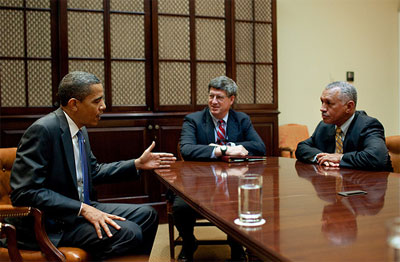An open letter to President Obamaby Louis Friedman
|
| These recommendations are just the kind of mid-course correction the Constellation Program needs. Giving that program a boost and a velocity change is no shame for NASA and they should not be defensive about the change. |
It is now up to our political leadership to seize and implement the recommendations. The Committee recommended heavy-lift launch vehicle development with Mars as its goal. They recommended that NASA de-emphasize its focus on reaching low Earth orbit, letting the private sector do that routine; until they succeed we always have international partners to do the mundane missions while our new rocket goes beyond. They recommended using our new rocket and crew vehicle to go into interplanetary space with steps away from Earth toward Mars. They recommended giving the International Space Station new purpose and new life as an international way station preparing humans for long-duration interplanetary travel. And they recommended that the government provide adequate support and adequate authority to allow NASA to truly and efficiently meet the challenges in space “worthy of a great nation.” We might re-phrase that based on the new understanding of the importance of international cooperation and using space benefits to protect Earth as, “worthy of a great planet.”
These recommendations are just the kind of mid-course correction the Constellation Program needs. Giving that program a boost and a velocity change is no shame for NASA and they should not be defensive about the change. Norm Augustine made that clear in endorsing their technical conduct of the Constellation program and the Ares rocket development. But times and budget and economies change—what is needed now is more flexibility, more international engagement, and a greater awareness of the popular interest.
Characterizing the report and the opportunity as exciting and inspiring is not just public relations: it is fundamental to the rationale for human space flight. On its own, there is no compelling scientific, economic, or security interest for sending humans into space. Rather, we do it to inspire the world and declare our (whoever is doing it) greatness. It is done to advance the political power and prestige of the country or countries involved. (Why else would China and India embark on it? Why did the US and the Soviet Union?) Scientific, economic, or security benefits may come, but these are usually secondary gains.
We don’t know yet what you have in mind for NASA or how you are going to handle the issue of human space flight. We are sure you will not cancel it, but how will you advance it? We see two distinct possibilities: a great one that would have us engage the world and several generations to take the next great leap, or a mundane one that would have us locked in Earth orbit with little purpose and a level of risk that exceeds its gain. The 1970s shuttle decision produced a great vehicle and a magnificent technological accomplishment, but ultimately a poor program with no destination and little purpose. We hope this type of decision will not be repeated, and believe that the stage has been set for something much grander.
It will take the creativity of technical teams, the leadership of the political system, and the will of people from across the globe to play well on this stage. Augustine and his colleagues have written a good script. The show needs a producer—will that be you?
